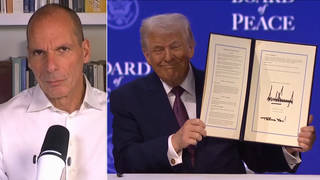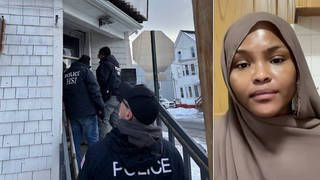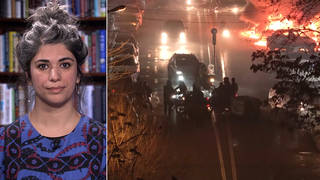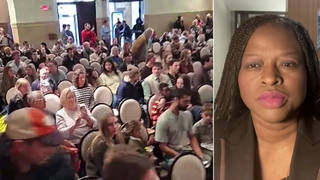
Guests
- Khalil Gibran Muhammadprofessor of African American studies and public affairs at Princeton University.
After announcing the federal takeover of law enforcement in D.C. in the White House briefing room, President Trump painted a grim picture of the capital — including “roving mobs of wild youth” — that contrasts with crime figures showing D.C. reached a 30-year low in violent crime last January. Khalil Gibran Muhammad, professor of African American studies and public affairs at Princeton University, says the move is an extension of Trump’s “use of racist rhetoric, racist ideas, and the use of policing to enact a domestic policy agenda.”
“This is a man who has consistently scapegoated Black and Brown people to either gain celebrity or political capital. And now as president the second time, he is enacting an authoritarian agenda,” says Muhammad.
Transcript
JUAN GONZÁLEZ: I’d like to bring in Khalil Gibran Muhammad, professor of African American studies and public affairs at Princeton University. Professor, your reaction to this, this latest move of President Trump? And also, if you could talk somewhat about why the District of Columbia is in this special status of, essentially, a territory within the United States, not even a — and why D.C. statehood has been stalled for so long?
KHALIL GIBRAN MUHAMMAD: Good morning, everyone.
So, I think that we are seeing a consistent pattern from Donald Trump. We can start with the calls for the return of the death penalty in 1989 in reference to the rape of a white woman in Central Park, which ultimately led to the conviction of five innocent young Black boys. Donald Trump has never apologized for that moment, placing a full-page ad in The New York Times. So, if we start with the man that we’ve known as a public for the better part of seven decades, this is a man who has consistently scapegoated Black and Brown people to either gain celebrity or political capital. And now as president the second time, he is enacting an authoritarian agenda, in which case the militarization of law enforcement and the deployment of law enforcement assets to either coerce or control scapegoated populations, as we saw in Los Angeles recently, is consistent.
And this is, in particular, an escalation, because while he tested the waters in deploying the Marines and 4,000 National Guard troops in Los Angeles, now we see the takeover, as Monica has already described, of a local police department. And while he has, as we’ve discussed, that right to do so, at least for a limited period, it’s not clear that he’s going — not going to stop. He’s calling for the same in New York. He’s calling for the same in Chicago.
And I just want to remind everyone that the Trump administration elected in 2016 came in riding on a lie about American carnage in American cities. This was also a period of dramatically declined crime rates and violent crime rates, in particular, across U.S. cities. So, there is nothing here that is factual in terms of the pretext for the calls here. What is consistent is Donald Trump’s use of racist rhetoric, racist ideas, and the use of policing to enact a domestic policy agenda.
AMY GOODMAN: Khalil Gibran Muhammad, can you also talk about the fact that the DOJ recently lifted the consent decrees over police departments that have histories of brutality? So, on the one hand, you have that. On the other hand, of course, he is naming, from Oakland to Baltimore, from L.A. to Chicago to New York, historically communities with large Black and Brown communities.
KHALIL GIBRAN MUHAMMAD: That’s right. Listen, we are way past any notion here that these are legitimate concerns. You’ve already pointed out that the 1,600 insurrectionists, many of whom pose an absolute, direct threat to law enforcement — 140 injured, as you mentioned — means that there’s no neutral ground upon which we could have a factual discussion, and then we might lead to different interpretations, but we’re not even dealing with facts here.
And it’s really, really important that you point out the removal of consent decrees, particularly from Minneapolis, which the former Department of Justice, under the Biden administration, and Merrick Garland, in particular, identified a pattern and practice of wide-scale discrimination and anti- — or, in this case, unconstitutional policing.
Donald Trump doesn’t care about any rule of law. What he cares about is flexing the power of the executive branch of government against named and so-called enemies. And as long as he can get away with it, without congressional oversight, and a claim of a popular mandate, which, of course, is not entirely true from the election, but nevertheless he is using the pretext of public opinion who elected him to get away with this. And it is a slide towards a fascism. All of this is textbook around the world. And we ought to be deeply concerned about the future of all of us with respect to the capacity of this particular president to use and threaten a coercive state violence against his so-called enemies.
JUAN GONZÁLEZ: I wanted to ask you also about the inclusion of the homeless in this latest press conference that the president had. On Sunday, en route from the White House to his golf course in Virginia, he wrote on Truth Social, the homeless have to go out immediately, and that we will give you places to stay, but far from the capital.
KHALIL GIBRAN MUHAMMAD: Well, again, I think a global perspective is very helpful here. We’ve seen this same president threaten to turn Gaza into the Riviera of the Middle East. That is a massive population experiencing ethnic cleansing and genocide. The definition of houselessness or homelessness doesn’t even apply at the scale of a humanitarian crisis.
So, in the United States, the same policies are essentially shovel ready for this person, for this president, meaning that the criminalization of people who are victims of an unequal society, of the criminalization of poverty by often local officials, who have not found the resources to support the healthcare and housing needs of homeless populations. So, then to essentially threaten to turn those populations into criminal populations — that is, to treat them as if their poverty is a crime — is consistent, again, with the policies of this administration when it comes to people, both in the U.S. and in Gaza and in other parts of the world.
AMY GOODMAN: In fact, what percentage — I don’t know if you know — of the unhoused are veterans?
KHALIL GIBRAN MUHAMMAD: I don’t know in D.C., but Monica may. It’s significant. But, yes, we know — I mean, it would be laughable if it weren’t so dangerous and absurd. But again, this is a president, we should remind folks, who ran by mocking veterans in this country, who claims the mantle of being the toughest commander-in-chief, but who consistently disrespects those who have served in this country, and in this case, as you mentioned, Amy, who may in fact be experiencing houselessness in a disproportionate way in this country.
AMY GOODMAN: Khalil Gibran Muhammad, we thank you so much for being with us, professor of African American studies and public affairs at Princeton, author of the book The Condemnation of Blackness: Race, Crime, and the Making of Modern Urban America, speaking to us from the historically Black community of Oak Bluffs in Martha’s Vineyard.
Coming up, from deploying troops at home to deploying them abroad, Trump has secretly signed a directive approving the use of military force on foreign soil. He says it’s to target Latin American drug cartels. Stay with us.
[break]
AMY GOODMAN: Ana Tijoux in our Democracy Now! studio. To see our interview and her singing, go to democracynow.org.










Media Options